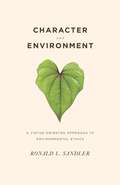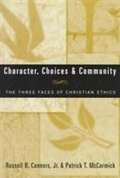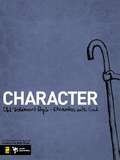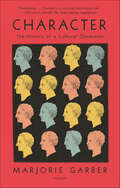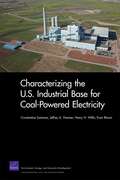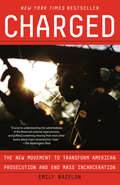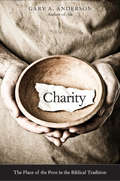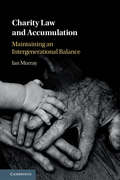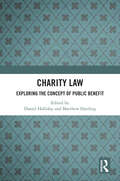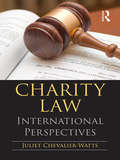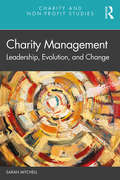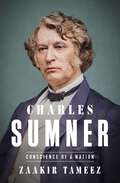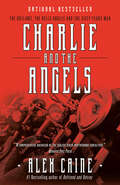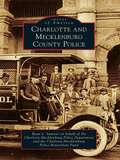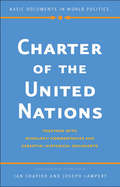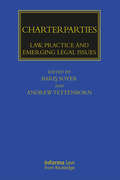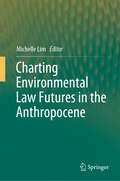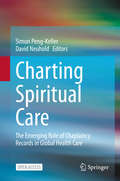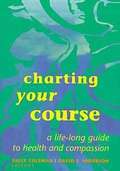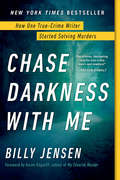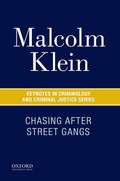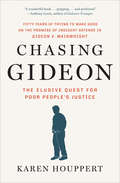- Table View
- List View
Character and Environment: A Virtue-Oriented Approach to Environmental Ethics
by Ronald SandlerVirtue ethics is now widely recognized as an alternative to Kantian and consequentialist ethical theories. However, moral philosophers have been slow to bring virtue ethics to bear on topics in applied ethics. Moreover, environmental virtue ethics is an underdeveloped area of environmental ethics. Although environmental ethicists often employ virtue-oriented evaluation (such as respect, care, and love for nature) and appeal to role models (such as Henry Thoreau, Aldo Leopold, and Rachel Carson) for guidance, environmental ethics has not been well informed by contemporary work on virtue ethics. With Character and Environment, Ronald Sandler remedies each of these deficiencies by bringing together contemporary work on virtue ethics with contemporary work on environmental ethics. He demonstrates the many ways that any ethic of character can and should be informed by environmental considerations. He also develops a pluralistic virtue-oriented environmental ethic that accommodates the richness and complexity of our relationship with the natural environment and provides effective and nuanced guidance on environmental issues. These projects have implications not only for environmental ethics and virtue ethics but also for moral philosophy more broadly. Ethical theories must be assessed on their theoretical and practical adequacy with respect to all aspects of the human ethical situation: personal, interpersonal, and environmental. To the extent that virtue-oriented ethical theory in general, and Sandler's version of it in particular, provides a superior environmental ethic to other ethical theories, it is to be preferred not just as an environmental ethic but also as an ethical theory. Character and Environment will engage any reader with an interest in environmental ethics, virtue ethics, or moral philosophy.
Character, Choices And Community: The Three Faces Of Christian Ethics
by Russell B. Conners Patrick T. MccormickHighlights the key elements of the Catholic moral tradition and lays the foundations for Christian ethics through experiential reflections of right action toward persons, communities and personal choices.
Character: Old Testament People—Encounters with God
by Richard ParkerThe Bible is full of characters, especially in the Old Testament. Whether it's the first humans created, the first murderer recorded, or the few righteous people on earth, the characters we find in the Old Testament reveal a lot about ourselves, and our r
Character: The History of a Cultural Obsession
by Marjorie Garber“In her wide-ranging cultural history of the term [‘character’], Garber has unearthed fascinating material and is a convivial, stimulating critic.” —Michael Saler, The Times Literary SupplementSince at least Aristotle’s time, philosophers, theologians, artists, and scientists have pondered the enigma of human character. Whether defined as a moral idea, a literary persona, or a scientifically observable type, character has become omnipresent in discussions of politics, ethics, gender, morality, and the psyche. In this “magisterial book,” Marjorie Garber examines the evolution and influence of this pervasive concept.Is there a connection between “character” in the moral sense and the “character” of a novel or a play? Can character be “formed” or taught in schools, in scouting, in the home? From Plutarch to John Stuart Mill, from Shakespeare to Darwin, from Theophrastus to Freud, from nineteenth-century phrenology to twenty-first-century brain scans, the search for the sources and components of human character still preoccupies us.With her distinctive verve, humor, and erudition, Marjorie Garber explores the stakes of these conflations, confusions, and heritages, from ancient Greece to the present day.
Characterizing the U.S. Industrial Base for Coal-Powered Electricity
by Henry H. Willis Constantine Samaras Jeffrey A. Drezner Evan BloomTo determine whether the industrial base for the U. S. domestic coal-based electricity generation industry can maintain the capability to design, construct, operate, and maintain coal-fired electricity generating units within reasonable cost, schedule, performance, environmental, and quality expectations, this book reviewsinterviews with stakeholders and data describing key elements of industry capability and validation or verification of concerns.
Charged: The New Movement To Transform American Prosecution And End Mass Incarceration
by Emily BazelonA renowned journalist and legal commentator exposes the unchecked power of the prosecutor as a driving force in America’s mass incarceration crisis—and charts a way out.<P><P>The American criminal justice system is supposed to be a contest between two equal adversaries, the prosecution and the defense, with judges ensuring a fair fight. <P><P>That image of the law does not match the reality in the courtroom, however. Much of the time, it is prosecutors more than judges who control the outcome of a case, from choosing the charge to setting bail to determining the plea bargain. They often decide who goes free and who goes to prison, even who lives and who dies. <P><P>In Charged, Emily Bazelon reveals how this kind of unchecked power is the underreported cause of enormous injustice—and the missing piece in the mass incarceration puzzle. <P><P>Charged follows the story of two young people caught up in the criminal justice system: Kevin, a twenty-year-old in Brooklyn who picked up his friend’s gun as the cops burst in and was charged with a serious violent felony, and Noura, a teenage girl in Memphis indicted for the murder of her mother. <P><P>Bazelon tracks both cases—from arrest and charging to trial and sentencing—and, with her trademark blend of deeply reported narrative, legal analysis, and investigative journalism, illustrates just how criminal prosecutions can go wrong and, more important, why they don’t have to. <P><P>Bazelon also details the second chances they prosecutors can extend, if they choose, to Kevin and Noura and so many others. <P><P>She follows a wave of reform-minded D.A.s who have been elected in some of our biggest cities, as well as in rural areas in every region of the country, put in office to do nothing less than reinvent how their job is done. If they succeed, they can point the country toward a different and profoundly better future. <P><b>A New York Times Bestseller</b>
Charity
by Gary A. AndersonIt has long been acknowledged that Jews and Christians distinguished themselves through charity to the poor. Though ancient Greeks and Romans were also generous, they funded theaters and baths rather than poorhouses and orphanages. How might we explain this difference? In this significant reappraisal of charity in the biblical tradition, Gary Anderson argues that the poor constituted the privileged place where Jews and Christians met God. Though concerns for social justice were not unknown to early Jews and Christians, the poor achieved the importance they did primarily because they were thought to be "living altars," a place to make a sacrifice, a loan to God that he, as the ultimate guarantor, could be trusted to repay in turn. Contrary to the assertions of Reformation and modern critiques, belief in a heavenly treasury was not just about self-interest. Sifting through biblical and postbiblical texts, Anderson shows how charity affirms the goodness of the created order; the world was created through charity and therefore rewards it.
Charity Law and Accumulation: Maintaining an Intergenerational Balance
by Ian MurrayMuch has been written in charity law on the type of benefits that charities can provide - charitable purposes - and towards whom such benefits must be directed - the public benefit question. Almost nothing has been written about when benefits must be provided. However, accumulation of assets by charities raises profound ethical, economic and social considerations that are highlighted by the present retreat of the welfare state and the impact of the Global Financial Crisis and COVID-19. This book analyses the issue through a normative, doctrinal and comparative analysis of the legal constraints upon accumulation by charities. It reveals that the legal restraints contain significant gaps in relation to the intergenerational distribution of benefits and to the balance of decision-making between generations. In particular, the book asserts that there is room for law reform to better identify and incorporate principles of intergenerational justice into the regulation of charities.
Charity Law and the Liberal State
by Matthew HardingCharity Law and the Liberal State considers questions relating to state action and public discourse that are raised by the law of charity. Informed by liberal philosophical commitments and of interest to both charity lawyers and political philosophers, it addresses themes and topics such as: the justifiability of the state's non-neutral promotion of charitable purposes; the role of altruism in charity law; charity law, the tax system and the demands of distributive justice; the proper treatment of religious and political purposes in charity law; and the appropriate response of the liberal state to discrimination in the pursuit of charitable purposes.
Charity Law: Exploring the Concept of Public Benefit
by Daniel Halliday and Matthew HardingThis book investigates and critically evaluates the concept of public benefit within charity law in the common law world. In the course of the study the book: provides a rich account of how the concept of public benefit has developed over time in charity law jurisprudence; deepens understanding of the aspects of public benefit that remain poorly understood even today; and suggests ways in which public benefit jurisprudence might develop in an orderly and principled way so as to better address some of the core concerns of charity law and the public policy objectives that lie behind it. The book includes contributions from world leading charity law experts and jurists. Each chapter reflects on a key aspect of public benefit jurisprudence in charity law. The topics have been chosen carefully to ensure coverage of most if not all of the large unresolved questions relating to public benefit in the common law world. Each chapter is accompanied by a comment, written by an academic expert or leading practitioner. The comments complement the chapters by critically engaging with those chapters and by offering different and thought-provoking perspectives on the subject matter of the chapters. The book will be of interest to academics working in law, philosophy, economics, sociology and political science. It will also provide a valuable resource for legal practitioners and judges, government officials, especially charity regulators, and in the not-for-profit sector itself.
Charity Law: International Perspectives
by Juliet Chevalier-WattsThis work provides an analytical and comparative analysis of the development of charity law, as well as providing a critical commentary on a number of contemporary changes within the charity law field across a range of common law jurisdictions. The book follows earlier studies which cover a similar, and traditional, jurisdictional spread, but which are now dated. It further considers in detail charity law issues within Hong Kong and Singapore, about which there has been historically more limited charity law discussion. The area is growing in terms of practical legal and academic interest.
Charity Management: Leadership, Evolution, and Change (Charity and Non-Profit Studies)
by Sarah MitchellBritain faces challenges that weren’t imaginable thirty years ago, challenges which charities, rooted as they are in community action and the public good, should be ideally suited to tackle. But the charity sector seems paralysed. Even after a decade of cuts and immense social and environmental disruption charities are still fighting hard to maintain business as usual. To develop new responses to our changing world the charity sector desperately needs to reinvent itself, radically re-engaging with communities and developing powerful and scalable responses to the challenges facing the UK in the coming decades. What are the ties that bind charities, rendering them unable to re-invent themselves and to re-imagine their services, even when they face existential crises? This book explores how charities in the UK really operate, as seen through the eyes of people who work in and with charities, and investigates what holds charities back from change. It demonstrates what we can learn from entrepreneurship and market disruption in the private sector, and points to ways in which the sector can re-imagine what it does and how it does this. It presents a new ambition for charities to break free of their history and imagine a new role for themselves in shaping the future for our society. Presenting a new ambition for charities to imagine a new role for themselves in shaping the future for our society, this volume is especially valuable for academics and professionals in the fields of charity and non-profit management, organisational change, and strategic management.
Charles Sumner: Conscience of a Nation
by Zaakir Tameez"A thorough recounting of the great legislator’s life and deed... unlikely to be bettered anytime soon... Tameez is expert at explaining Sumner’s legal thought... One cannot help wishing we had a Charles Sumner in Washington today."—The New York Times"An excellent book about the courageous Massachusetts senator... Drawing from hundreds of letters, articles and speeches, Mr. Tameez has created a remarkable portrait of a complex man who faced many personal challenges... Charles Sumner is a moving portrayal of a courageous, long-overlooked American who, in the words of one contemporary, 'stood in the vanguard of Freedom.'”—Wall Street JournalA landmark biography of Charles Sumner, the unsung hero of the American Civil War and ReconstructionCharles Sumner is mainly known as the abolitionist statesman who suffered a brutal caning on the Senate floor by the proslavery congressman Preston Brooks in 1856. This violent episode has obscured Sumner’s status as the most passionate champion of equal rights and multiracial democracy of his time. A friend of Alexis de Tocqueville, an ally of Frederick Douglass, and an adviser to Abraham Lincoln, Sumner helped the Union win the Civil War and ordain the Emancipation Proclamation, the Thirteenth Amendment, the Freedmen’s Bureau, and the Civil Rights Act of 1875. In a comprehensive but fast-paced narrative, Zaakir Tameez presents Sumner as one of America’s forgotten founding fathers, a constitutional visionary who helped to rewrite the post–Civil War Constitution and give birth to modern civil rights law. He argues that Sumner was a gay man who battled with love and heartbreak at a time when homosexuality wasn’t well understood or accepted. And he explores Sumner’s critical partnerships with the nation’s first generation of Black lawyers and civil rights leaders, whose legal contributions to Reconstruction have been overlooked for far too long.An extraordinary achievement of historical and constitutional scholarship, Charles Sumner brings back to life one of America’s most inspiring statesmen, whose formidable ideas remain relevant to a nation still divided over questions of race, democracy, and constitutional law.
Charles Taylor’s Ecological Conversations: Politics, Commonalities And The Natural Environment
by Glen LehmanThe author uses the work of the eminent Canadian philosopher, Charles Taylor, to develop a critique of those political perspectives that are based on instrumental ways to reason about the world, claiming that such perspectives invariably sever the connections between the social and natural worlds.
Charlie and the Angels: The Outlaws, the Hells Angels and the Sixty Years War
by Alex CaineThe Outlaws Motorcycle Club's story is told here for the first time, by criminal underworld author and former infiltrator Alex Caine. They are the original biker gang, and their sixty years of war with the Hells Angels is the stuff of legend.Right down to their signature logo (a skull known as "Charlie"), the McCook Outlaws Motorcycle Club, formed in 1935, defined the look and sensibility of the twentieth-century biker. In the 1950s, a rising gang of toughs in California threatened to steal their thunder. But, recognizing an opportunity for expansion, the Outlaws reached out. The nascent Hells Angels sent them home to Chicago, beaten, humiliated and forever bent on the Angels' destruction.Sixty years and thousands of maimed and murdered later, the Hells Angels are a dominant criminal empire. The Outlaws, loosely allied with the number-two club in the biker universe, the Bandidos, sit contentedly as the number-three power, though they rule in places like the UK, the Great Lakes, Florida and the US Midwest. Less concerned with making money than the Angels, they continue to define the vicious biker character like few of their peers.Working undercover, Alex Caine witnessed the buffering of the big clubs' US turfs in a Bandidos-mediated truce between the Outlaws and Angels in the 1980s. But like every deal between bikers, that one soured, and a storm of unimaginable violence and scope is brewing. The alliance is expanding and determined to unseat the Angels for once and for all.
Charlotte and Mecklenburg County Police (Images of America)
by Charlotte-Mecklenburg Police Department Ryan L. SumnerFor nearly a century and a half, police in Charlotte and Mecklenburg County have displayed tremendous courage and sacrifice in the execution of their duty, adapted to social and cultural changes within the American South, and increasingly embraced sophisticated methods and revolutionary advances in technology to meet the challenges posed by criminals and a violent culture. Images of America: Charlotte and Mecklenburg County Police highlights the rich history of two departments that consolidated in 1993 as the Charlotte-Mecklenburg Police Department.
Charter of the United Nations
by Ian Shapiro Joseph LampertThis volume contains the full text of the United Nations Charter and the Statute of the International Court of Justice, as well as related historical documents. They are accompanied by ten original essays on the Charter and its legacy by distinguished scholars and former high-level UN officials. The commentaries illuminate the early and ongoing roles of the United Nations in responding to international crises, debates about the UN’s architecture and its reform, and its role in global governance, climate change, peacekeeping, and development. A concise and accessible introduction to the UN for students, this collection also offers important new scholarship that will be of interest to experts.
Charterparties: Law, Practice and Emerging Legal Issues (Maritime and Transport Law Library)
by Andrew Tettenborn Barış SoyerThis book consists of edited versions of the papers delivered at the Institute of International Shipping and Trade Law’s 12th International Colloquium at Swansea Law School in September 2016. Featuring a team of contributors at the top of their profession, both in practice and academia, these papers have been carefully co-ordinated so as to ensure to give the reader a first class insight into the issues surrounding charterparties. The book is set out in three parts. -Part I offers a detailed and critical analysis of issues of contemporary importance concerning time charters. -Part 2 carries out a similar analysis with regard to voyage charterparties. -Part 3 deliberates issues common to both type of charterparties. Offering critical analysis of contemporary legal issues on charterparty contracts, this book considers recent legal and practical developments and is therefore essential reading for both professional and academic readers with an interest in charterparties.
Charting Environmental Law Futures in the Anthropocene
by Michelle LimThis book explores a range of plausible futures for environmental law in the new era of the Earth’s history: the Anthropocene. The book discusses multiple contemporary and future challenges facing the planet and humanity. It examines the relationship between environmental law and the Anthropocene at governance scales from the global to the local. The breadth of issues and jurisdictions covered by the book, its forward-looking nature, and the unique generational perspective of the contributing authors means that this publication appeals to a wide audience from specialist academics and policy-makers to a broader lay readership.
Charting Spiritual Care: The Emerging Role of Chaplaincy Records in Global Health Care
by Simon Peng-Keller David NeuholdThis open access volume is the first academic book on the controversial issue of including spiritual care in integrated electronic medical records (EMR). Based on an international study group comprising researchers from Europe (The Netherlands, Belgium and Switzerland), the United States, Canada, and Australia, this edited collection provides an overview of different charting practices and experiences in various countries and healthcare contexts. Encompassing case studies and analyses of theological, ethical, legal, healthcare policy, and practical issues, the volume is a groundbreaking reference for future discussion, research, and strategic planning for inter- or multi-faith healthcare chaplains and other spiritual care providers involved in the new field of documenting spiritual care in EMR. Topics explored among the chapters include: Spiritual Care Charting/Documenting/Recording/AssessmentCharting Spiritual Care: Psychiatric and Psychotherapeutic Aspects Palliative Chaplain Spiritual Assessment Progress Notes Charting Spiritual Care: Ethical Perspectives Charting Spiritual Care in Digital Health: Analyses and Perspectives Charting Spiritual Care: The Emerging Role of Chaplaincy Records in Global Health Care is an essential resource for researchers in interprofessional spiritual care and healthcare chaplaincy, healthcare chaplains and other spiritual caregivers (nurses, physicians, psychologists, etc.), practical theologians and health ethicists, and church and denominational representatives.
Charting your Course: A Life-Long Guide to Health and Compassion
by David Anderson Sally ColemanAlthough this is a textbook written for young people, its applications are much broader: the person thinking about career change; the young parent; the new grandparent; the spiritual leader/planner. "Charting Your Course is based on Seven Health Principles. Each principle identifies a vital area of life and presents a healthy orientation toward that area. The seven areas are attitude, personal values, holistic health, relationships, community, the natural world, and service to others."
Chase Darkness with Me: How One True-Crime Writer Started Solving Murders
by Billy Jensen***With an exclusive behind-the-scenes conversation between Billy Jensen and retired detective Paul Holes on the Golden State Killer, their favorite cold cases, and more***Have you ever wanted to solve a murder? Gather the clues the police overlooked? Put together the pieces? Identify the suspect?Journalist Billy Jensen spent fifteen years investigating unsolved murders, fighting for the families of victims. Every story he wrote had one thing in common—they didn't have an ending. The killer was still out there.But after the sudden death of a friend, crime writer and author of I'll Be Gone in the Dark, Michelle McNamara, Billy became fed up. Following a dark night, he came up with a plan. A plan to investigate past the point when the cops had given up. A plan to solve the murders himself.You'll ride shotgun as Billy identifies the Halloween Mask Murderer, finds a missing girl in the California Redwoods, and investigates the only other murder in New York City on 9/11. You'll hear intimate details of the hunts for two of the most terrifying serial killers in history: his friend Michelle McNamara's pursuit of the Golden State Killer and his own quest to find the murderer of the Allenstown Four. And Billy gives you the tools—and the rules—to help solve murders yourself.Gripping, complex, unforgettable, Chase Darkness with Me is an examination of the evil forces that walk among us, illustrating a novel way to catch those killers, and a true-crime narrative unlike any you've read before.
Chasing After Street Gangs: A Forty-Year Journey (Keynotes in Criminology and Criminal Justice)
by Henry N. Pontell Malcolm KleinIn this brief, accessible text, Malcolm Klein presents insights gained from his forty years of experience investigating street gangs. In Part I he reveals some of the dominant trends that have emerged over the course of his research, defining and describing gangs, their locations, who joins them, and the types of illegal behavior in which they engage. In Part II he delves into the conceptual contexts that help us to understand those trends, examining gangs in relation to other small groups, comparing gangs in the U.S. to those in Europe, and discussing approaches to gang control.
Chasing Gideon: The Elusive Quest for Poor People's Justice
by Karen HouppertThe Washington Post reporter delivers a groundbreaking investigation into the nation&’s crisis of indigent defense—&“a hugely important book&” (New York Law Journal). A Nieman Report&’s Top Ten Investigative Journalism Books of 2013 First published to mark the fiftieth anniversary of the Supreme Court decision Gideon v. Wainwright, which guaranteed all criminal defendants the right to legal counsel, Chasing Gideon offers a personal journey through our systemic failure to fulfill this basic constitutional right. Written in the tradition of Anthony Lewis&’s landmark work Gideon&’s Trumpet, it focuses on the stories of four defendants in four states—Washington, Florida, Louisiana, and Georgia—that are emblematic of nationwide problems. Revealing and disturbing, it is &“a book of nightmares&” because it shows that the &“&‘justice system&’ that too often produces the exact opposite of what its name suggests, particularly for its most vulnerable constituents&” (The Miami Herald). Following its publication, Chasing Gideon became an integral part of a growing national conversation about how to reform indigent defense in America and inspired an HBO documentary as well as the resource website GideonAt50.org. &“Chasing Gideon is a wonderful book, its human stories gripping, its insight into how our law is made profound.&” —Anthony Lewis, author of Gideon&’s Trumpet
